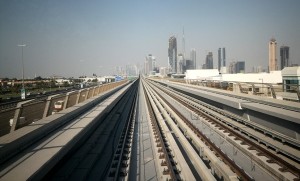Source: www.ameinfo.com
Transport infrastructure specialists from all over the world will converge on the Abu Dhabi National Exhibition Centre (ADNEC) today as the biennial Roadex-Railex show, the largest exhibition for the road, rail and public transport sectors in the Middle East this year, gets underway.
 Traditionally regional government would spend the overwhelming majority of their transport infrastructure budget (projected to reach nearly $120bn by 2020) on major road projects, indeed the GCC will spend at least $10bn over the next ten years. However, transportation policies across the region have now changed, with rail projects and public transportation now coming to the fore.
Traditionally regional government would spend the overwhelming majority of their transport infrastructure budget (projected to reach nearly $120bn by 2020) on major road projects, indeed the GCC will spend at least $10bn over the next ten years. However, transportation policies across the region have now changed, with rail projects and public transportation now coming to the fore.
“Countries throughout the Middle East have the highest traffic density and fatality figures anywhere in the world. Now in a bid reduce congestion, cut carbon emissions, improve safety and travelling times as well as eliminate reliance on air transport, regional governments are embarking on a massive investment programme to construct a network of rail systems,” said Richard Pavitt, Exhibition Director, Roadex-Railex.
To that end, GCC countries have approved the construction of a GCC wide rail network estimated to cost in the region of US$60 billion. The network will be initially made up of 2,177km of high speed, electrified line carrying trains travelling up to speeds of 350 km/hour. Overall more than $109 billion will be spent on regional rail projects over the next 10 years.
The UAE has already committed $7.6bn in Dubai on the Metro (red and green lines) and another $3.26bn on several major road projects which is addition to a public-private partnership (PPP) with Italian construction and infrastructure company Salini Costruttori, to overhaul sections of the UAE-Saudi Arabia Highway.
While Kuwait and Saudi Arabia plan to introduce metro systems shortly, in Abu Dhabi, the design plans for a 131 kilometre monorail track are almost complete with the majority of the $7 billion system running underground again protecting the environment and also the asthetics of the city above ground. Budgeting is also in process to pay for the high-speed rail link with Dubai and a freight rail corridor.
“Abu Dhabi in particular through the development of carbon neutral MASDAR City has made no secret of its intentions to make the UAE capital one of the most environmentally friendly cities in the world. So by replacing short haul flights with trains (CO2 emissions from trains are 90% less per passenger than those from aeroplanes) Abu Dhabi will be able to fulfil its promise to the environment,” added Pavitt.
Roadex-Railex is held in partnership with the Abu Dhabi Department of Transport and the Abu Dhabi Department of Municipal Affairs and is supported by Abu Dhabi Police and road traffic accident management company, Saaed. The three-day show focuses on four key aspects of transport infrastructure, Road, Rail, Public Transport and Parking. This year the event has attracted 130 exhibitors from 23 countries covering more than 2,500 square metres of exhibition space.
Other key sponsors include Pandrol Railtech and Kassab Media as well as security and defence organisation Westminister Technologies, which is hosting an onsite VIP reception to coincide with the official opening of show.
Running in parallel with the exhibition will be the International Road Federation’s 2nd Middle East regional congress as well as the Leaders in Rail conference, which will address the challenges that lie ahead for companies and individuals tasked with planning and delivering major transport infrastructure projects.


















